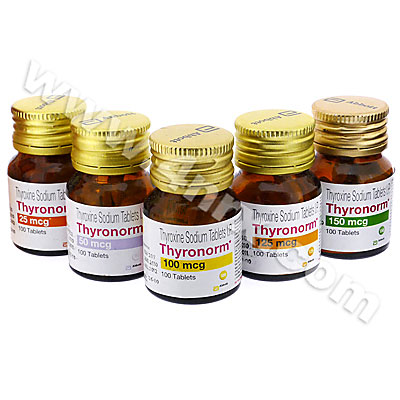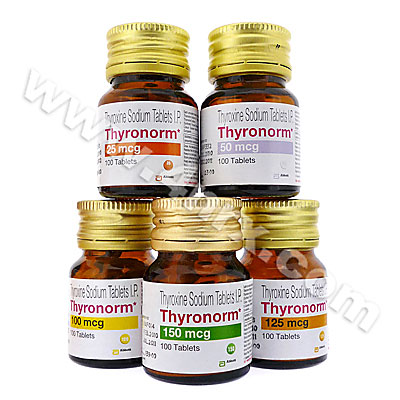 |
Home  Thyroid Thyroid  Thyronorm (Thyroxine Sodium) Thyronorm (Thyroxine Sodium) |
|
|||||||||
|
Thyronorm (Thyroxine Sodium)
What is Thyronorm (Thyroxine Sodium) used for? Thyronorm (Thyroxine Sodium) contains the active ingredient thyroxine sodium, which is the same as the hormone that is naturally produced by the thyroid gland. It is used to treat an underactive thyroid (hypothyroidism), a condition in which the thyroid does not produce enough thyroid hormones. It works by replacing the thyroxine which would normally be produced by the thyroid gland. This helps to prevent symptoms such as hair loss, increased sensitivity to cold, tiredness, weight gain and other symptoms. This drug may also be used to treat an enlarged thyroid. How should I use Thyronorm (Thyroxine Sodium)? Thyronorm (Thyroxine Sodium) tablets are normally taken once per day, usually without food. You may be told to take it in the morning, a half hour to an hour before you eat breakfast. Before taking this medication, your physician will tell you the correct dosage. You must follow the instructions of your physician. He or she may tell you to take a low dosage to begin with, and your dosage may be increased. Several weeks of treatment may be required before the full benefits of this drug are noticed. What are the side effects of Thyronorm (Thyroxine Sodium)? Thyronorm (Thyroxine Sodium) may causes side effects, including:
If you notice any side effects while taking this medication, you should immediately tell your physician. This drug may also cause other more serious side effects. Please Note Strictly follow all instructions provided to you by your physician or pharmacist while using Thyronorm (Thyroxine Sodium). Optimum and safe dosage can differ based on the patient and the condition being treated. As this medication may be unsafe for certain patients, it is essential you always inform your physician if you are pregnant or breastfeeding, as well as if you have any allergies, other illnesses, or ongoing health conditions, and if you are taking any other form of medication, supplements, or herbal products. Immediately seek emergency medical care if you have any allergic or hypersensitive reaction. Common signs of a reaction include hives, swelling, skin rashes, chest pains, as well as trouble breathing or swallowing. 

|
|||||||||||||||||